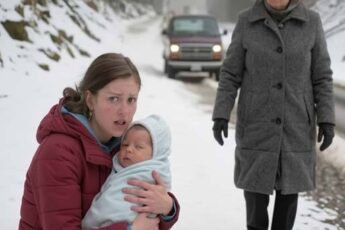I grew up in a place where the sky is still black when the day begins, where the word vacation means the county fair, and the air carries the sweetness of potatoes pulled straight from the earth. My parents worked harder than anyone I have ever known—grit in their bones, dirt in their palms, pride in every single callus. I thought that kind of life earned respect.
I was wrong.
When I earned a scholarship to a private school in the city, it felt like stepping into a dream. My big break. A doorway to a new world. But on the very first day, I walked into homeroom in my cleanest pair of jeans—still faintly touched with the scent of the barn—and a girl with a perfect, glossy ponytail leaned over to her friend and whispered loud enough for me to hear:
— “Ew. Do you live on a farm or something?”
I lowered my eyes and pretended I didn’t hear. But it didn’t stop there.
— “What kind of shoes are those?”
— “Wait—you don’t even have WiFi at home?”
One boy smirked and asked if I rode a tractor to school.
So I stayed quiet. I buried myself in textbooks, turned my accent soft, never once mentioned the fields or the market back home. But the shame twisted deep inside me, sharp as a knife. Because at home, I wasn’t “that farm girl.” I was Mele. I could patch a tire faster than most dads, catch a runaway chicken in the dark, and sell out our stall at the market before noon. My parents had built something with their bare hands. Why did I feel like I had to hide it?
The turning point came during the school fundraiser. Everyone had to bring something from home to sell. Most kids arrived with store-bought cookies or polished crafts their nannies had glued together. I showed up with six sweet potato pies—my family’s recipe, the one we bake every holiday, the one that smells like love itself.
They were gone in twenty minutes. Sold out. People were asking if I had more.
That’s when Ms. Bell, the guidance counselor, found me standing shyly in the corner. She smiled at me and said words I’ll never forget. But before she could finish, someone else stepped up beside me—someone I never thought would even look at me, let alone ask me that question.
It was Claire.
The same Claire with the glossy ponytail who had whispered on my first day, the one who made sure everyone laughed when she wrinkled her nose at my shoes.
She stood there, holding an empty pie plate like it was made of gold.
— “Did you really bake this?” she asked, her voice smaller than I had ever heard it.
For a moment, I didn’t answer. My throat was tight. Around us, kids were still milling about, but suddenly the whole room felt quieter, like the air itself was waiting.
— “Yes,” I finally said. “My family’s recipe. From the farm.”
Claire looked down at the plate, then back at me.
— “It’s the best thing I’ve ever tasted. Could you… maybe… teach me?”
I blinked. Of all the things she could have said, that wasn’t even on the list.
Before I could respond, Ms. Bell placed a gentle hand on my shoulder. She was smiling.
— “Mele, you know what I was about to tell you? Never be ashamed of where you come from. What you carry is something these kids can’t buy in a store. It’s pride. It’s history. It’s real.”
The words sank into me deeper than any insult ever had.
That night, when I went home, I told my parents everything. About the laughter, about the fundraiser, about the way people looked at me when the pies vanished from the table. My mother wiped her hands on her apron and said softly:
— “People will always think dirt under your nails makes you small. But that dirt is where life begins. That dirt feeds the world. Never forget that.”
For the first time, I didn’t feel the need to.
The next week at school, I wore the same boots I used to hide. When someone asked me if I’d be bringing more pies, I smiled and said, “Maybe. If I’m not too busy driving the tractor.”
They laughed—but this time, not at me. With me.
Because I had finally understood something: I wasn’t less for being a farmer’s daughter. I was more.
And I always would be.







